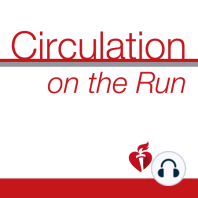25 min listen
Circulation October 25, 2022 Issue
ratings:
Length:
30 minutes
Released:
Oct 24, 2022
Format:
Podcast episode
Description
This week, please join Circulation's Associate Editor Marc Ruel and Executive Editor James de Lemos as they summarize all of the articles found in Circulation's annual Cardiovascular Surgery-Themed Issue for 2022. Dr. James de Lemos: Hi, welcome to Circulation on the Run. Greg and Carolyn are off today. My name is James de Lemos. I'm the executive editor for Circulation and I'm delighted to be joined today by Marc Ruel, who's the editor of our themed issue on cardiac surgery and leads the development and curation of all of the cardiac surgery content in Circulation. Marc, congratulations to you, to Mike Fischbein, to the whole Circ team on another spectacular effort to pull together this issue. Glad to have you here today. Dr. Marc Ruel: Well, thank you very much, James. It's really a team effort. I want to salute and thank the vision of Circulation to really give an important component to surgical science. As you often hear me say, your surgery provides the most durable and robust solution for advanced heart disease, right? So it's a very important part of the mission of Circulation as the premier cardiovascular journal. I want to thank you and also Joe Hill, our Editor-in-Chief and obviously the entire team of Circulation as well as all staff. Augie [Rivera], who is helping us on this call as well as Nick [Murphy] and many others who have made this issue possible. Dr. James de Lemos: Well, great. Well, let's get to this. And you recognize as well Mike Fischbein, who's the Cardiac Investor surgeon at Stanford who helps to edit the themed issue and really helps us to think about basic science into surgical specialties. Let me start, Marc, with cardiac bypass surgery. We have actually three papers in this issue that cover various aspects of CABG. The first one is one that you and I really resonated with, I know, because we talked about this. It's a paper by Ono from the SYNTAX Extended Survival study titled "Impact of Patient Reported and Pre-Procedural Physical and Mental Health on 10 year Mortality after PCI or CABG." And this is a really fascinating paper, looked at obviously patients with left main or multi vessels coronary disease, but used objective measures of physical and mental function from the SF-36 score and calculated summary physical and mental component scores. And then used those scores to evaluate whether there were treatment interactions based on physical and mental performance metrics with regard to the benefit of CABG over PCI. And really fascinating, first that there was an interaction and that the magnitude of benefit of CABG over PCI for multi vessel disease was substantially greater among individuals that had higher physical performance as well as mental health performance. What did you think of this paper and data? I know you wrote a tremendous editorial to this. So this is something that you thought about as we were bringing the paper in, but also had to think about in terms of putting this paper in the context of this daily decision for patients with multi vessel disease. Dr. Marc Ruel: Thanks James. And I agree with you. I think this is a bit of a new paradigm, right, to really think of the individual patient decision. It's a form of precision medicine if you will, with regards in this case to physical functioning and mental functioning prior to something as invasive as undergoing CABG. So I want to thank you, the Circulation leadership for inviting Anne Williams who's a cardiologist and yours truly to write a tutorial on this piece because I do think you, that is really, it is something that's quite intriguing and it makes sense. I think it is intuitive. I think clinicians who send patients to CABG and see them come back and hopefully in a good state, the very vast majority of the time, do realize nevertheless that CABG is a very invasive procedure. So the patient has to be actively involved in her or his recovery. And interestingly as you pointed out, there's quite a effect modification if you will
Released:
Oct 24, 2022
Format:
Podcast episode
Titles in the series (100)
Circulation November 1, 2016 Issue: Dr. Carolyn Lam: Welcome to Circulation On The Run, your weekly podcast summary and backstage pass to the journal and its editors. I'm Dr. Carolyn Lam, Associate Editor from The National Heart Center and Duke National University of Singapore.... by Circulation on the Run
